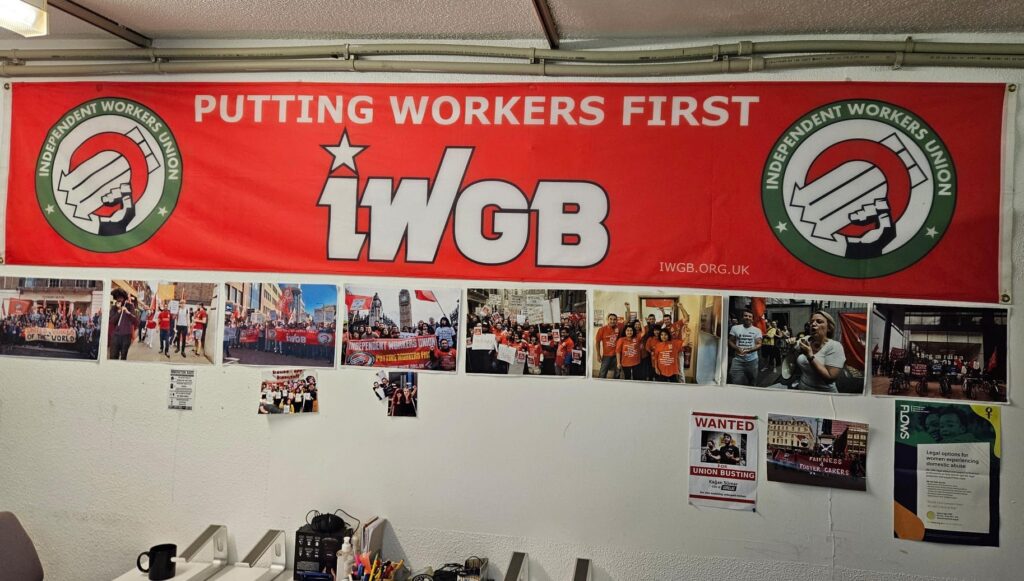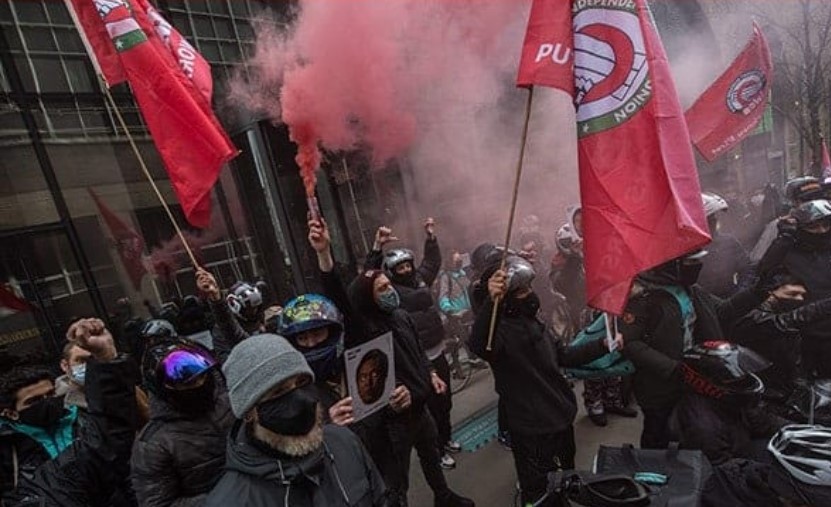Ray Goodspeed spoke to ALEX MARSHALL, the full-time National President of the Independent Workers’ Union of Great Britain (IWGB), about the UK Supreme Court decision, on 21st November, that Deliveroo drivers were “independent contractors” and not “workers” or “employees” as defined by the 1992 Act and that, therefore, they did not have the right of trade union recognition or collective bargaining.
We discussed this complex legal case, the implications of the judgement, the role of the GMB union and the future TU organising in Deliveroo and in the food delivery sector in general. [Featured photo – PA]
***
RG – The recent Supreme Court judgement regarding Deliveroo workers has been a disappointment and possibly a bit of a surprise. Can you give us the brief background of the issues involved?
AM – OK – The “Courier and Logistics” branch of IWGB was formed back in 2015 because we had workers in the “gig economy”. A lot of these were working for more conventional companies such as “City Sprint”, “E-Courier” doing “last mile delivery” [RG – ie to the end use customers] and we realised that pay was really bad. So they came together and started pushing companies and we actually had some quite quick wins early on through direct action.

But what we also realised was that these workers were fundamentally being denied basic rights. So the General Secretary at the time, alongside the branch, took a strategic decision to continue the “power building” through recruitment but also to support this through some strategic litigation so we would have some test cases rumbling through the courts to try and get workers these rights that were being denied.
So in City Sprint, E-Courier, Addison Lee we went for straightforward “workers’ status” cases at Employment Tribunals and we were successful. We won holiday pay, pensions – you know – rights that came with official “worker” status.
With Deliveroo, at the time, we thought we would try something different, so we went through the route of the CAC (Central Arbitration Committee). This is the channel you go through when you are trying to get union recognition. It’s basically a bureaucratic hurdle that has been installed to take the sting out of workers organising on the ground but we have used it in the past to help to build union density by saying to workers “If enough of you join, we will be able to force the company to sit down at the table and negotiate on certain things”.
So the crux of our Deliveroo strategy was – instead of gong through a straightforward “workers status” case at an ET we were going along the route of saying “We have a density of workers in Camden and we think these workers should be able to get union recognition and be able to collectively bargain on certain issues like pay and conditions”.
For us this was, a roundabout way of arguing that these members are “workers”, because the CAC, of course, said that as only “workers” or “employees” (as opposed to “independent contractors”) have the right to trade union recognition they needed to establish whether the people concerned are officially “workers” under the law. The CAC decided that they were not, and the IWGB sought a judicial review of that decision.
Then, just before the case went to Court, Deliveroo installed a small clause into their contracts which was the “right to substitute” which means that a delivery rider can send someone in their place to carry out a job. In practice, this doesn’t really happen. The official way to substitute, where you have to say “I am contracting my work to this worker. I have made sure they have done the DBS [criminal record] check, they are paying tax” etc is nonsense. Yet this clause was enough for the judge to find that they are “independent contractors”, running their own little businesses, and not “workers”. Therefore they are not entitled to collective bargaining rights.
In theory – Deliveroo claim that a worker can get half way through delivering an order and have a breakdown and then contact a mate who then picks up the food and completes the order. But we are seeing delivery drivers who are terminated for taking too long on deliveries! Imagine if a driver is, like, phoning someone and saying, “Oh hello mate – can you come and pick this up…!” They would be terminated in a heartbeat. It is nothing more than a cynical clause that has been installed to strip workers of these rights.
It is worrying that this has been given credence and can now be replicated in different workplaces and I think we might see it creep more and more into different industries. I would not be surprised if there are nannies, cleaners and beauticians and so on who are working via an app who are not able to bring “worker status” ET cases because of this tiny little line in their contract that says they can substitute.
We appealed the decision and that had gone all the way through the different courts. Before we went to the Supreme Court, we had seen that this “substitution clause” led to us being previously unsuccessful. However, in the meantime there had been the Uber ruling, where Uber drivers had been classified as “workers” and we thought that had somewhat changed the complexion of the case. Although Uber drivers don’t have the ability to substitute, as they are tied to their specific cars etc, their terms and conditions are very similar to food delivery workers.
We were thinking that maybe this would help the judges at least make some more adventurous determinations that can help to shape future case law. Unfortunately we had judges who did not seem to have the necessary familiarity with the issues that would allow them to say that these judgements are based on very archaic interpretation of what a “worker” is, and that they needed to redefine the term worker, as this was created in a law of 1992 but is now being applied to gig work and is redundant.
RG – so you lost the case. Was there huge financial costs?
AM – We were fortunate enough to have the support of the ITF (the International Transport Federation) who underwrote the case and covered the costs. So as a union, the IWGB has not incurred loads of costs.
RG – Does this judgement stop you from doing anything you have previously organised?
AM – Not at all. As I said, it would have been helpful if they had found that these members were able to collectively bargain because that would have potentially paved the way for a “workers’ status” case where we could have argued that Deliveroo drivers are workers and therefore should be getting holidays and pensions – similar to Uber drivers.

But the IWGB organise in a lot of workplaces where we don’t have collective bargaining agreements – or have recognition.
We also have workplaces where, like Deliveroo, employers have cynically made a deal with alternative unions as a way of trying to get in the way of our organising and to confuse workers by saying “Don’t join the IWGB – join this union instead!”.
RG – Yes – where does this leave the Deliveroo/GMB union deal?
The weird thing is that the workers don’t have collective bargaining rights but the GMB union made an agreement with Deliveroo that they would have this “partnership” (not a recognition agreement as such). But if you talk to any workers, since the GMB has “partnered” with Deliveroo, conditions have got worse. During the cost-of-living crisis, they have not introduced anything that has improved the lives of workers and if anything, pay has decreased. So I don’t know what the intricacies of that deal have done for the GMB. I don’t think it’s boosted their membership. The way people cynically view Deliveroo – if they are recommending a union, a lot of the workers are not gonna touch it with a barge pole.
RG – But given that you have lost the case for recognition, how can another union be recognised?
AM – Yeah but they can still, in theory, enter into an agreement with a union even if the people are so-called “independent contractors”. They can do what they want. Deliveroo have always been careful to say that this is a “partnership” and not a recognition agreement It is essentially a deal which has “union-washed” Deliveroo. The number of times we hear them say, “We’re not bad. We’ve got this great agreement with this really old trade union – the GMB – and we have a really good working relationship”.
RG – Ok. So anyone who thought that this legal judgment would stop you from organising Deliveroo workers is wrong? You can still carry on organising, striking, and so on but you just can’t have official collective bargaining rights?
AM – Of course – I mean, one of the most important things to always remember is that even if we do get recognition, these things are only really activated when workers show their industrial strength. So you can have a recognition agreement – you can have a seat at the table – but the employer is going to walk all over you unless they are scared to. And that is what it always comes down to.
We don’t need a seat at the table to organise workers to take action and win things. Anything such as pay, improving conditions, access to restaurants, parking spaces in boroughs – whatever it is – can be done through the collective strength of workers, whether they have a seat at the table or not.
RG – What has been the reaction of Deliveroo workers to all of this?
AM – I think some of the workers have been quite confused by it. It was quite a complex and abstract case and the way it was being portrayed in the media is that in the gig economy, if you are a food delivery worker, you cannot unionise because of this ruling – which is nonsense! Anyone can unionise. Any group of similar workers can form a union and start to exercise that collective strength whether or not your employer recognises you or has to recognise you.

[Photo Guy Smallman]
For me, this whole thing has been a bit of a distraction. A lot of the time workers have been indoctrinated to think, “There is an injustice – we should sue them” or “Surely there should be some legal framework that can support us as individuals” and unfortunately the law, including the ways to get union recognition – is set up to favour and protect the employers. For us in the IWGB it’s like – “No. You guys need to focus on building that power amongst yourselves because if you build enough of it, you can completely transform companies without recognition – without any of this stuff. You can withdraw your labour – and they are screwed”.
RG – So you are not going any further with legal action. I heard talk of going to the European Court of Human Rights.
AM – We are considering our options. We have taken it this far and there are a couple of different avenues that we can explore. One of them is the ECHR – but they have made some kind of “right-leaning” rulings recently. Another option is going to the International Labour Organisation (ILO) and getting them to look at some of the terminology. They have a team of experts.
RG – Well a lot of British law breaks ILO regulations anyway…
AM – but they may be able to challenge some terminology. As I said – I think litigation can be useful and we have found it really useful. We have had “workers status cases” going on at the same time as building power in the workplace. For some workers, that gave them confidence, but in the meantime, you can orientate them towards building collective power – so it can just be a useful strand.
But for me – where the real power lies is not in the courts. As we saw in the P&O case, employers brazenly break the law because the fines they will incur – if any at all – are much cheaper than actually having to abide by it. And as we saw with the Uber Supreme Court ruling, where drivers were classified as “workers”, Uber have implemented it – essentially, by giving them holiday pay but drivers are paying for their holiday from their own pocket. Prices have gone down – or Uber’s commission has gone up – and they are getting something for their holiday but overall they are getting less money because they don’t have that industrial strength to ensure the way it is implemented.
But if you do have that industrial strength, you will have the employer eating out of the palm of your hand. What we need to focus on is building that power .
RG – Just one last thing – are there any suggestions that Labour – if they get in – will change the law on this point.
AM – Well there was talk around the single status. I am not sure what the implications are of this ruling on a “single status” because a lot of the workers they were hoping would be scoped up by this single status will just be outside of it as independent contractors. I also think that the “single status” had flaws to it. I don’t think some workers necessarily want it. I don’t think there was enough consultation with gig workers who might have been able to feed into it.
We need to create a manifesto. We are the ones who are plugged into these workers. This was a strategy that we had at the beginning and even in the six or seven years I’ve been involved in the union, the climate, the power that these employers have, the dynamics of the gig economy, have completely changed and we need to think about moving away, perhaps, from the strategic litigation backed up by worker power and really just focus on worker power and defining how we want the gig economy to look.
[NB – You can donate to give solidarity to the work of the IWGB at the link here ]



